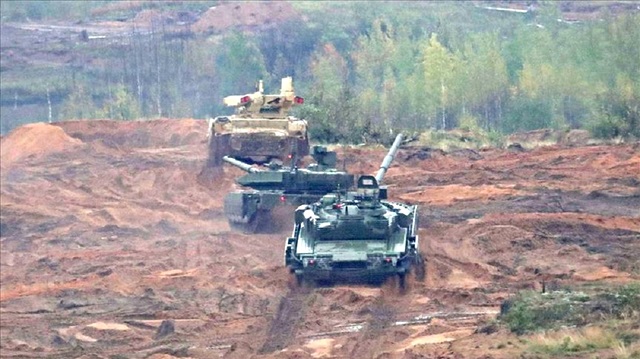
Security analysts view joint drills as attempt by Moscow to 'balance out' its missile deal with New Delhi
Pakistani and Russian armed forces on Monday launched joint maneuvers in a latest sign of the growing military ties between the two countries.
A Russian army contingent has arrived in Pakistan to participate in the joint military exercise "Druzhba-III", Pakistan Army spokesperson Major Gen. Asif Ghafoor said in a statement.
The two-week-long drills will last through Nov. 4.
This is the third part of a series of military drills in the ongoing Pakistan-Russia military cooperation which was agreed on in a defense deal signed in 2014.
The first part of the exercises was held in Pakistan in 2016 and the second one was in Russia in 2017.
Islamabad and Moscow have accelerated defense cooperation in recent years following Pakistan's deteriorating ties with the U.S., mainly on Afghanistan.
Islamabad received four Mi-35 attack helicopters from Moscow last year for $153 million.
Russia, along with China, has appeared as an alternative to the U.S. in the face of Washington's burgeoning defense partnership with New Delhi.
Moscow has also shown interest in the multi-billion-dollar China-Pakistan Economic Corridor (CPEC) project, which is the part of Beijing’s most ambitious foreign economic initiative -- One Belt One Road.
The $64 billion project aims to connect northwest China to Pakistan's southwestern Gwadar port through a network of roads, railways, and pipelines to transport cargo, oil, and gas.
The route will provide the shortest way to Chinese cargo destined for the Middle East, Central Asia, and Africa.
Pakistan has reportedly agreed to give Russia access to the Gwadar port for trade in return for a planned Russian railway track between the port and the northwestern Chaman border though details about the port-for-railway deal have yet to emerge.
Security analysts view the joint exercises as an attempt by Moscow to "balance out" its missile deal with New Delhi.
India has inked a deal of $5 billion to purchase an S-400 air defense missile system during Russian President Vladimir Putin visit to the country on Oct. 5.
The two sides, Mahmood opined, shared some common interests in the region, especially in the war-stricken Afghanistan, behind their increasing partnership.
"Russia is worried about a possible fall out of the ongoing insurgency in Afghanistan via the Central Asian States. That's why it [Moscow] is equally interested in peace in Afghanistan, for which Pakistan is a common denominator," he said.
For Pakistan, he agreed, Russia has emerged as another option in terms of defense cooperation following icy relations between Islamabad and Washington -- two former allies in the so-called war on terror.








